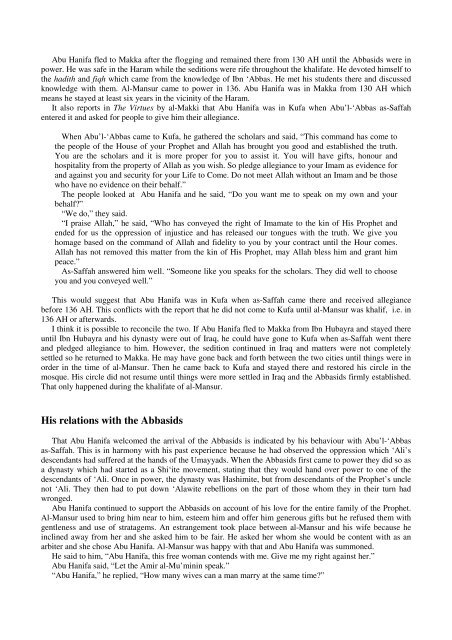You also want an ePaper? Increase the reach of your titles
YUMPU automatically turns print PDFs into web optimized ePapers that Google loves.
<strong>Abu</strong> <strong>Hanifa</strong> fled to Makka after the flogging <strong>and</strong> remained there from 130 AH until the Abbasids were in<br />
power. He was safe in the Haram while the seditions were rife throughout the khalifate. He devoted himself to<br />
the hadith <strong>and</strong> fiqh which came from the knowledge of Ibn ‘Abbas. He met his students there <strong>and</strong> discussed<br />
knowledge with them. Al-Mansur came to power in 136. <strong>Abu</strong> <strong>Hanifa</strong> was in Makka from 130 AH which<br />
means he stayed at least six years in the vicinity of the Haram.<br />
It also reports in The Virtues by al-Makki that <strong>Abu</strong> <strong>Hanifa</strong> was in Kufa when <strong>Abu</strong>’l-‘Abbas as-Saffah<br />
entered it <strong>and</strong> asked for people to give him their allegiance.<br />
When <strong>Abu</strong>’l-‘Abbas came to Kufa, he gathered the scholars <strong>and</strong> said, “This comm<strong>and</strong> has come to<br />
the people of the House of your Prophet <strong>and</strong> Allah has brought you good <strong>and</strong> established the truth.<br />
You are the scholars <strong>and</strong> it is more proper for you to assist it. You will have gifts, honour <strong>and</strong><br />
hospitality from the property of Allah as you wish. So pledge allegiance to your <strong>Imam</strong> as evidence for<br />
<strong>and</strong> against you <strong>and</strong> security for your <strong>Life</strong> to Come. Do not meet Allah without an <strong>Imam</strong> <strong>and</strong> be those<br />
who have no evidence on their behalf.”<br />
The people looked at <strong>Abu</strong> <strong>Hanifa</strong> <strong>and</strong> he said, “Do you want me to speak on my own <strong>and</strong> your<br />
behalf?”<br />
“We do,” they said.<br />
“I praise Allah,” he said, “Who has conveyed the right of <strong>Imam</strong>ate to the kin of <strong>His</strong> Prophet <strong>and</strong><br />
ended for us the oppression of injustice <strong>and</strong> has released our tongues with the truth. We give you<br />
homage based on the comm<strong>and</strong> of Allah <strong>and</strong> fidelity to you by your contract until the Hour comes.<br />
Allah has not removed this matter from the kin of <strong>His</strong> Prophet, may Allah bless him <strong>and</strong> grant him<br />
peace.”<br />
As-Saffah answered him well. “Someone like you speaks for the scholars. They did well to choose<br />
you <strong>and</strong> you conveyed well.”<br />
This would suggest that <strong>Abu</strong> <strong>Hanifa</strong> was in Kufa when as-Saffah came there <strong>and</strong> received allegiance<br />
before 136 AH. This conflicts with the report that he did not come to Kufa until al-Mansur was khalif, i.e. in<br />
136 AH or afterwards.<br />
I think it is possible to reconcile the two. If <strong>Abu</strong> <strong>Hanifa</strong> fled to Makka from Ibn Hubayra <strong>and</strong> stayed there<br />
until Ibn Hubayra <strong>and</strong> his dynasty were out of Iraq, he could have gone to Kufa when as-Saffah went there<br />
<strong>and</strong> pledged allegiance to him. However, the sedition continued in Iraq <strong>and</strong> matters were not completely<br />
settled so he returned to Makka. He may have gone back <strong>and</strong> forth between the two cities until things were in<br />
order in the time of al-Mansur. Then he came back to Kufa <strong>and</strong> stayed there <strong>and</strong> restored his circle in the<br />
mosque. <strong>His</strong> circle did not resume until things were more settled in Iraq <strong>and</strong> the Abbasids firmly established.<br />
That only happened during the khalifate of al-Mansur.<br />
<strong>His</strong> relations with the Abbasids<br />
That <strong>Abu</strong> <strong>Hanifa</strong> welcomed the arrival of the Abbasids is indicated by his behaviour with <strong>Abu</strong>’l-‘Abbas<br />
as-Saffah. This is in harmony with his past experience because he had observed the oppression which ‘Ali’s<br />
descendants had suffered at the h<strong>and</strong>s of the Umayyads. When the Abbasids first came to power they did so as<br />
a dynasty which had started as a Shi‘ite movement, stating that they would h<strong>and</strong> over power to one of the<br />
descendants of ‘Ali. Once in power, the dynasty was Hashimite, but from descendants of the Prophet’s uncle<br />
not ‘Ali. They then had to put down ‘Alawite rebellions on the part of those whom they in their turn had<br />
wronged.<br />
<strong>Abu</strong> <strong>Hanifa</strong> continued to support the Abbasids on account of his love for the entire family of the Prophet.<br />
Al-Mansur used to bring him near to him, esteem him <strong>and</strong> offer him generous gifts but he refused them with<br />
gentleness <strong>and</strong> use of stratagems. An estrangement took place between al-Mansur <strong>and</strong> his wife because he<br />
inclined away from her <strong>and</strong> she asked him to be fair. He asked her whom she would be content with as an<br />
arbiter <strong>and</strong> she chose <strong>Abu</strong> <strong>Hanifa</strong>. Al-Mansur was happy with that <strong>and</strong> <strong>Abu</strong> <strong>Hanifa</strong> was summoned.<br />
He said to him, “<strong>Abu</strong> <strong>Hanifa</strong>, this free woman contends with me. Give me my right against her.”<br />
<strong>Abu</strong> <strong>Hanifa</strong> said, “Let the Amir al-Mu’minin speak.”<br />
“<strong>Abu</strong> <strong>Hanifa</strong>,” he replied, “How many wives can a man marry at the same time?”














